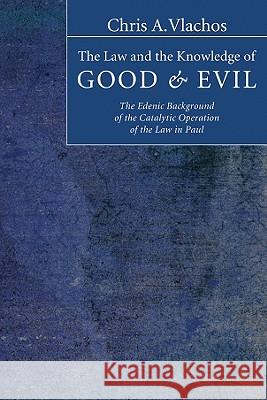The Law and the Knowledge of Good and Evil » książka
The Law and the Knowledge of Good and Evil
ISBN-13: 9781597528641 / Angielski / Miękka / 2009 / 314 str.
The Law and the Knowledge of Good and Evil
ISBN-13: 9781597528641 / Angielski / Miękka / 2009 / 314 str.
(netto: 164,42 VAT: 5%)
Najniższa cena z 30 dni: 170,29
ok. 16-18 dni roboczych.
Darmowa dostawa!
"Description: First Corinthians 15:56, ""The sting of death is sin, and the power of sin is the law,"" is both puzzling and neglected. It is puzzling since there appears to be no precursor in 1 Corinthians to the law-critical statement found there. It is neglected because of its size. Nevertheless, the short verse offers the opportunity to analyze in a rudimentary state Paul's law-sin notion that appears full-blown in Romans, and the absence of a polemical setting allows scholars to examine a law-critical statement issued during a polemical lull. In The Law and Knowledge of Good and Evil, Vlachos weighs attempts to explain the presence of 1 Cor 15:56 in 1 Corinthians and argues that the Genesis Fall narrative, where the tempter plied his seductions by way of the commandment, provides the theological substructure to Paul's understanding of the law's provocation of sin. In doing so, Vlachos contends that Paul reaches the historical high water mark of his polemic against the salvific efficacy of the law by locating a law-sin nexus in Eden, and, contrary to some recent perspectives on Paul, he argues that the edenically informed axiom in 1 Cor 15:56 suggests that Paul's fundamental concern with the law was rooted in primordial rather than ethnic soil. While studies of Paul and the law have tended to bypass Eden, The Law and Knowledge of Good and Evil breaks ground by moving the argument beyond Second Temple Judaism to the Genesis Fall account, where the prohibition against partaking of the knowledge of good and evil led to the knowledge of sin. About the Contributor(s): Chris A. Vlachos is Ph.D. Program Administrator and Adjunct Assistant Professor of Ancient Languages and New Testament at Wheaton College, Wheaton, Illinois. He is a co-author with Marvin R. Wilson of 'A Workbook for New Testament Greek: Grammar and Exegesis in First John' (1998)."
"Description:First Corinthians 15:56, ""The sting of death is sin, and the power of sin is the law,"" is both puzzling and neglected. It is puzzling since there appears to be no precursor in 1 Corinthians to the law-critical statement found there. It is neglected because of its size. Nevertheless, the short verse offers the opportunity to analyze in a rudimentary state Pauls law-sin notion that appears full-blown in Romans, and the absence of a polemical setting allows scholars to examine a law-critical statement issued during a polemical lull. In The Law and Knowledge of Good and Evil, Vlachos weighs attempts to explain the presence of 1 Cor 15:56 in 1 Corinthians and argues that the Genesis Fall narrative, where the tempter plied his seductions by way of the commandment, provides the theological substructure to Pauls understanding of the laws provocation of sin. In doing so, Vlachos contends that Paul reaches the historical high water mark of his polemic against the salvific efficacy of the law by locating a law-sin nexus in Eden, and, contrary to some recent perspectives on Paul, he argues that the edenically informed axiom in 1 Cor 15:56 suggests that Pauls fundamental concern with the law was rooted in primordial rather than ethnic soil. While studies of Paul and the law have tended to bypass Eden, The Law and Knowledge of Good and Evil breaks ground by moving the argument beyond Second Temple Judaism to the Genesis Fall account, where the prohibition against partaking of the knowledge of good and evil led to the knowledge of sin.About the Contributor(s):Chris A. Vlachos is Ph.D. Program Administrator and Adjunct Assistant Professor of Ancient Languages and New Testament at Wheaton College, Wheaton, Illinois. He is a co-author with Marvin R. Wilson of A Workbook for New Testament Greek: Grammar and Exegesis in First John (1998)."











